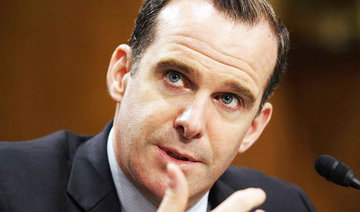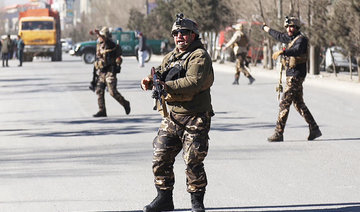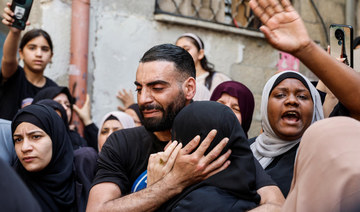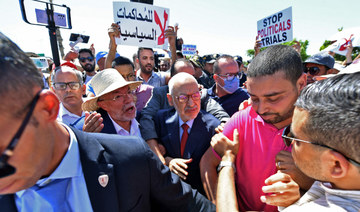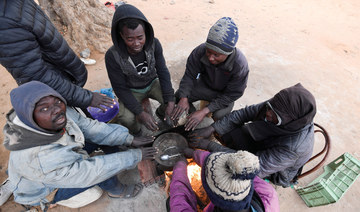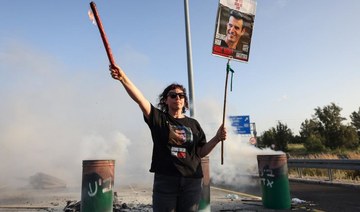MOSUL, Iraq: In 2014, Abdulrahman Saad was taken from his home in Mosul by Daesh fighters, leaving his family in limbo.
They asked Daesh security offices and judges: Where is our husband and father? No answer. When the operation to retake Mosul began, they heard he was being held in the western part of the city, with hundreds of other prisoners. But when the area was liberated, they found no trace of Saad, the 59-year-old owner of a wholesale food store.
“Life without my father is difficult,” says his son, Rami. Without him, the Saads struggle to get by, and his wife pines for her spouse.
In their misery, they have company. Since Mosul was declared liberated in July, residents have submitted more than 3,000 missing-persons reports to Nineveh’s provincial council, according to council member Ali Khoudier. Most of them are men or teenage boys. Some were arrested by Daesh during the group’s extremist rule; others were detained by Iraqi forces on suspicion of extremist ties.
Regardless, Iraqi government bureaucracy, inefficiency and neglect have left thousands of families across Iraq hanging as the country’s leadership celebrates the defeat of Daesh.
In a small garden outside of a Mosul courthouse, dozens wait to hear if investigators have news of their missing relatives. They cling to thick files of papers: identity documents, official forms, glossy family photos and “missing person” advertisements from a local paper. It is unlikely they will hear good news.
“It will be years before these people know what exactly happened to their relatives,” said an investigator, as anxious relatives tapped on the windows behind his desk and hovered at his office door.
The investigator, who spoke on condition of anonymity, said the Iraqi government doesn’t have enough forensic experts to exhume the dozens of mass graves discovered as territory has been retaken from Daesh. And the country’s judicial system isn’t equipped to efficiently process the thousands of detainees scooped up by security forces.
Some 20,000 people are being held at detention centers across Iraq on suspicion of ties to Daesh, according to a report from Human Rights Watch this month.
In Anbar province, where victory was declared in the cities of Ramadi and Fallujah more than a year ago, more than 2,900 people remain missing, according to Mohammed Karbouli, a member of Iraq’s parliamentary committee on defense and security from Anbar. He said those missing from Anbar are becoming a symbol of the lack of trust between Anbar’s mostly Sunni residents and the Shiite-dominated central government in Baghdad.
When parents don’t know the fate of their children, he warned, “tensions emerge.”
Just south of Mosul, an unthinkable number of Iraqis are believed to be buried in a natural sinkhole that became one of the Daesh group’s most infamous mass graves. Some Iraqi officials estimate as many as 4,000 people were tossed into the cavernous, natural crevasse in the barren desert on the road linking Mosul to Baghdad— some already dead, others still living and buried alive.
Daesh fighters “would bring them and make them get out (of the car) and line up at the edge of the hole,” said Mohammed Younis, a resident of the area, recounting the weeks and months leading up to the fight for Mosul. “They would line them up and then they would execute them. And the bodies would all fall into the hole.”
An AP investigation has found at least 133 mass graves left behind by the defeated extremists, and only a handful have been exhumed. Many of the missing — especially the thousands of Yazidis unaccounted for since Daesh fighters slaughtered and enslaved the minority — may ultimately be buried there. Estimates total between 11,000 and 13,000 bodies in the graves, according to the AP tally.
But not all of the missing were spirited away by Daesh. Some families in and around Mosul say their relatives were taken by unidentified gunmen after IS was defeated.
“It was the middle of the day, 3:30 in the afternoon. A silver pickup truck drove into the village and took my brother,” Elias Ahmed explained as he walked along the dusty main road leading to his home in the sprawling Bijwaniya agricultural village.
Ghazwan Ahmed was taken along with four other young men in August. They have not been seen since.
“The men who took him didn’t even identify themselves, they just said they worked in intelligence,” he explained.
Elias Ahmed spent weeks shuttling between the different headquarters buildings of Iraq’s disparate security services in and around Mosul. The federal police, Sunni tribal paramilitary fighters, local policemen and the Iraqi army all control different sections of Mosul and the surrounding Nineveh countryside. Each group maintains its own records of detentions and arrests.
Ahmed went looking for answers at a court north of Mosul in the small, historically Christian town of Tel Keif, established especially to process those charged with terrorism. Each morning, family members gather outside its gates in hope of tracking down missing relatives.
Inside, judges process close to 100 cases a day. Many trials last no longer than 30 minutes.
Yasser Hafahdy, an attorney from Mosul working at the court, defended the practice of arresting people without informing their families where they would be held or the charges against them. He said the court was overwhelmed by the sheer number of Daesh suspects arrested and could not spare the time or resources to reach out to families.
Since the court opened its doors in March, about a dozen judges have processed more than 15,000 cases. More than 60 percent have been found guilty, Hafahdy estimated.
“What we need is a Judge Dredd, you know, Sylvester Stallone,” Hafahdy said, referring to a 1995 dystopian action film in which a traditional justice system is replaced by armed judges who patrol city streets acting as police, judge, jury and executioner.
At a nearby detention center, hundreds of men sat in cramped rooms, and dozens of women and child detainees shuffled between a windowless room and an open courtyard.
“The Iraqi government was completely unprepared for all the people taken prisoner while fighting Daesh,” said an Iraqi lieutenant colonel overseeing a different detention center just south of Mosul. “Honestly we expected more field executions. But human rights organizations were monitoring the operations, so we began taking people prisoner instead.”
The Iraqi officer, who spoke on condition that he was only identified by his rank because he was not authorized to talk to journalists, said that during the Mosul operation hundreds of people passed through his detention center on their way to Baghdad for trials. During the height of the fighting, the small rooms used as makeshift cells were packed with prisoners.
“We know that this is a violation of human rights,” he said. The squalid conditions were due to the backlog of cases in Baghdad, he said, and families were unable to track down arrested relatives until the detainees were processed in the capital.
Rami Saad continues to look. The search has taken him to government detention centers and hospitals in and around Mosul and lawyers’ offices in Baghdad. Rami traveled to the Health Ministry’s forensic department in Mosul to look over lists of people confirmed killed by Daesh. If Abdulrahman Saad’s death could be established, at least the wife would receive his pension.
“But we didn’t find my father’s name,” Rami said, and so “we have a glimmer of hope. Perhaps he is still alive.”
Associated Press writers Qassim Abdul-Zahra and Salar Salim in Mosul, Muhanad Al-Saleh in Baghdad and Lori Hinnant in Paris contributed to this report.
Thousands remain missing after Iraq’s victories against Daesh
Thousands remain missing after Iraq’s victories against Daesh
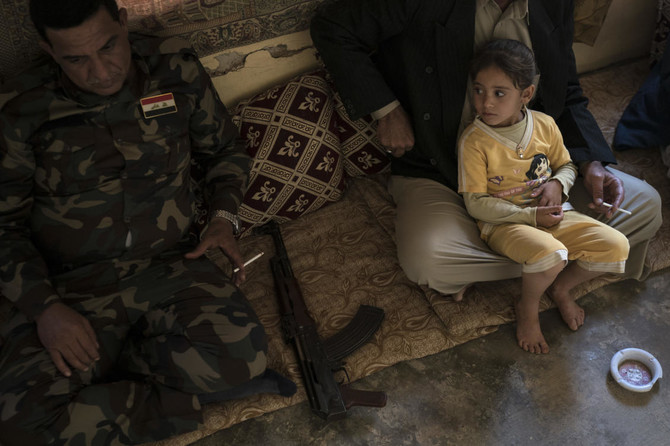
Israeli official says Hamas demand for end to war ‘thwarting’ truce efforts
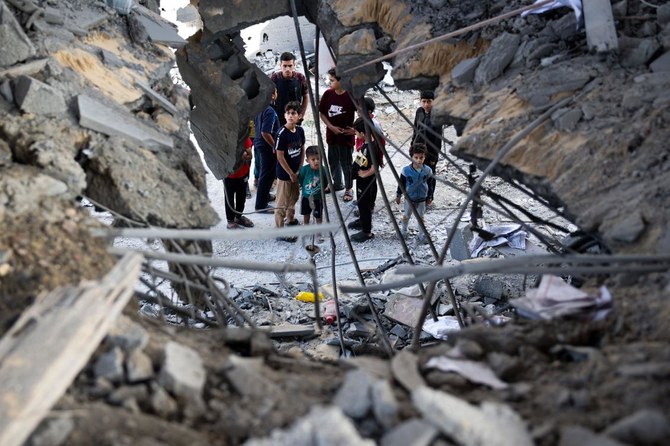
The official said suggestions Israel was prepared to allow mediators to provide Hamas with guarantees of an end to the war were also “not accurate“
JERUSALEM: A top Israeli official said Saturday that Hamas’s continued demand for a lasting ceasefire in the war in Gaza was stymying prospects of reaching a truce.
“So far, Hamas has not given up its demand to end the war, thus thwarting the possibility of reaching an agreement,” the official told AFP on condition of anonymity.
The official rejected reports that Israel had agreed to end the war as part of a deal to free the hostages held by Gaza militants.
The official said suggestions Israel was prepared to allow mediators to provide Hamas with guarantees of an end to the war were also “not accurate.”
The official’s comments came after Hamas negotiators returned to Egypt on Saturday to give their response to a proposed pause in the nearly seven-month war.
Mediators from Egypt, Qatar and the United States have been waiting for Hamas to respond to a proposal that would halt fighting for 40 days and exchange hostages for Palestinian prisoners in Israeli jails, according to details released by Britain.
Despite months of shuttle diplomacy between the warring parties, the mediators have been unable to broker a new truce like the week-long ceasefire that saw 105 hostages released last November, the Israelis among them in exchange for Palestinians held by Israel.
Thousands of Israelis rallied in Tel Aviv late Saturday demanding a deal to free the remaining hostages. They waved Israeli flags and placards calling on the government to “Bring them Home!“
Israel says 128 hostages remain in Gaza. The army says 35 of them are presumed dead.
On Saturday, shortly before 9 p.m. (1800 GMT), a senior Hamas source close to the negotiations in Cairo told AFP there had been “no developments” and the day’s talks “have ended.”
“Tomorrow, a new round will begin,” the source said.
Earlier, the Israeli official had said Israel would not send a negotiating team to Cairo until it saw “positive movement” on the framework for a hostage deal.
“What we are looking at is an agreement over a framework for a possible hostage deal,” the official said.
“Tough and long negotiations are expected for an actual deal.”
Hamas has said the main stumbling block is Israeli Prime Minister Benjamin Netanyahu’s insistence on sending ground troops into Rafah, the south Gaza city that is packed with displaced civilians.
Washington has said repeatedly that it opposes any military operation in Rafah that endangers the 1.2 million civilians sheltering there.
Relative calm in southern Lebanon amid talks on French peace plan and Israeli-US coordination
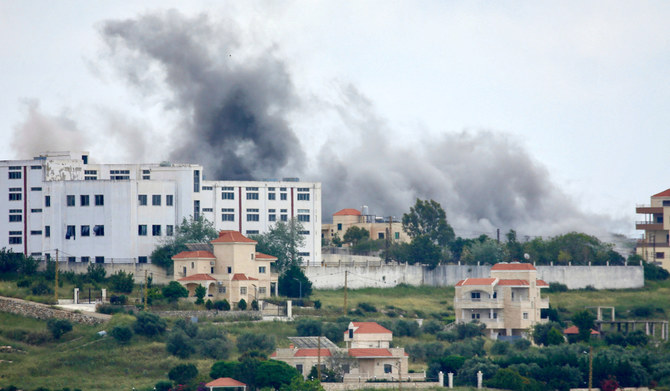
- Lebanese officials receive amended proposal that summarizes meetings held by Stephane Sejourne, France’s foreign minister, in Lebanon and Israel
- On Friday and Saturday there was a noticeable decline, generally, in hostilities between the two sides in southern Lebanon, though there were exceptions
BEIRUT: Discussions continued on Saturday about a French proposal designed to ease tensions and halt clashes between the Israeli army and Hezbollah along Lebanon’s southern border.
Lebanese officials received an amended version of the proposal on Friday, which summarized meetings held by Stephane Sejourne, France’s foreign minister, in Lebanon and Israel.
The proposal also aims to ensure the full implementation of UN Security Council Resolution 1701, which was adopted in 2006 with the aim of resolving the war that year between Israel and Hezbollah.
One political observer said Lebanese officials had prepared a response to the French document and were awaiting Israel’s response.
On Friday and Saturday there was a noticeable decline, generally, in hostilities between the two sides in southern Lebanon, though there were exceptions. One of them was the targeting of the “Israeli Meron Airbase in the Safed area on Friday from Lebanese territories,” Israeli authorities said. Hezbollah did not immediately claim responsibility for the attack. However, the group did say it shelled the Israeli site of Bayad Blida at dawn on Saturday while Israeli soldiers were there.
Meanwhile, the Israeli army opened fire in the vicinity of a shepherd in Wazzani but he was unharmed. Israeli artillery targeted Aita Al-Shaab, Jabal Blat and the outskirts of the towns of Naqoura and Alma Al-Shaab.
Extreme caution seemed to prevail in many border areas as Israeli reconnaissance warplanes continued to operate over Hasbaya and the occupied Shebaa Farms, reaching Western Bekaa and Iqlim Al-Tuffah.
In addition to the diplomatic processes related to the French peace plan, Lebanese authorities were also awaiting the outcome of negotiations in Cairo for a possible agreement between Israel and Hamas on a ceasefire in Gaza. Hezbollah previously linked any end to hostilities in southern Lebanon along the border with Israel to a ceasefire in the Gaza Strip.
Channel 12 news in Israel reported on Saturday that the security establishment in Tel Aviv believed Israeli authorities were close to an agreement with Hezbollah and Lebanon, similar to the provisions of UN Resolution 1701. It said the Israeli security establishment was working with US officials on the process, including American envoy Amos Hochstein, who oversaw indirect negotiations between Lebanon and Israel to demarcate their maritime borders in 2022.
Regarding the French peace plan, Nabih Berri, the speaker of the Lebanese Parliament, said he had received a copy of the document from the French Embassy in Lebanon and will respond.
“It included acceptable points and others that are unacceptable and must be amended, subject to discussion and review,” he added.
The revised proposal refers to a previous ceasefire agreement signed by Israel and Lebanon on April 26, 1996. It also highlights the steps that can be “taken to stop the escalation and ensure the effective implementation of UN Resolution 1701.”
Media leaks suggested its recommendations included “creating a monitoring group with the US, France, Lebanon and Israel. This group would oversee implementation and address any complaints from the involved parties in stages.”
The first stage would require Lebanese armed groups to halt their military operations inside Israel and disputed border regions, refrain from attacking personnel or facilities belonging to the UN Interim Force in Lebanon, and guarantee unrestricted freedom of movement for UNIFIL forces, including patrols in all areas south of the Litani River.
It calls on Israel to “halt military operations inside Lebanon, including airstrikes on Lebanese territory, refrain from any actions that may put UNIFIL personnel or facilities at risk, and ensure UNIFIL’s freedom of movement, including stopping the locking of aircraft radars on UNIFIL naval forces ships.”
Regarding UNIFIL’s mission in the first phase, the French initiative said the force will be “monitoring the cessation of hostilities on the ground and increasing the number of patrols and redeployments along the Blue Line to ensure effective respect for the cessation of hostilities and subsequent commitments by the parties.”
The Blue Line is a demarcation line dividing Lebanon from Israel that was set by the UN in June 2000 to determine whether Israeli forces had fully withdrawn from Lebanon.
The second phase of the French initiative, to be implemented within three days, would involve “dismantling all installations, facilities and centers near the Blue Line, including containers, small towers and tents, and the withdrawal of combat forces, including the Radwan militia, and military capabilities, including shooting capabilities in depth and anti-tank systems, for a distance of not less than 10 kilometers north of the Blue Line.”
It would also require Israel to “stop flying over Lebanese airspace.” It urges Lebanon to resume meetings of the tripartite mechanism, involving UNIFIL and the Israeli and Lebanese militaries, and deploy about 15,000 Lebanese soldiers along the Blue Line south of the Litani River, with UNIFIL and other international partners supporting this deployment.
During a 10-day third phase, Lebanon and Israel, with UNIFIL support, would be expected to resume talks about their land borders. These are intended build on negotiations that took place in 2017, and focus on areas already discussed in 2018 within the framework of the UNIFIL tripartite mechanism, with the aim of establishing an area between the Blue Line and the Litani River free of armed groups and weapons other than those related to the Lebanese government and UNIFIL.
These talks would take place in parallel with international efforts in the form of a support group to assist in the deployment of Lebanese forces in the southern region, and the social and economic development of the region.
Israeli forces kill five Palestinians in overnight raid near West Bank’s Tulkarm
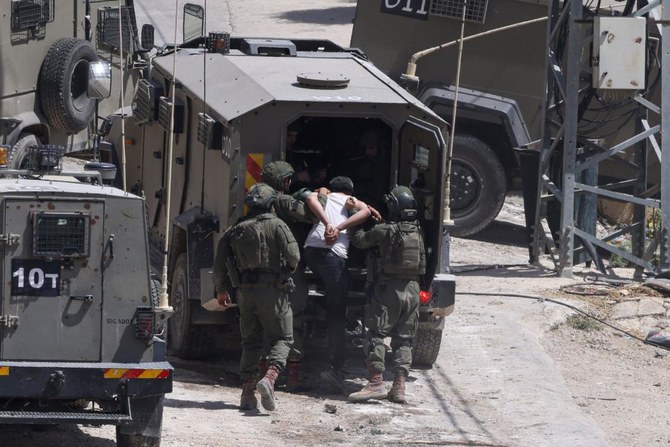
- The health ministry said it had identified four of the five who died during the raid in Deir Al-Ghusun
- The Israeli military said an officer from a special police unit was wounded in the operation and hospitalized
TULKARM, West Bank: Israeli forces killed five Palestinians in an overnight raid in a village near the city of Tulkarm in the occupied West Bank, the Palestinian health ministry and the Israeli military said on Saturday.
The health ministry said it had identified four of the five who died during the raid in Deir Al-Ghusun. Israeli forces took some of the dead bodies, according to the official Palestinian news agency Wafa and a Reuters reporter at the scene.
The Israeli military said an officer from a special police unit was wounded in the operation and hospitalized. It said its forces retaliated using live ammunition and shoulder-fired missiles after they were fired on.
Saturday’s operation near the flashpoint city of Tulkarm was the latest in a series of clashes in the occupied West Bank between Israeli forces and Palestinians that has been escalating for more than two years but which has picked up in intensity since the Hamas-led attack on Israel last October.
According to Palestinian Health Ministry records, 492 Palestinians have been killed by Israeli forces or Jewish settlers in the West Bank or East Jerusalem since Oct. 7. Many have been armed fighters but stone-throwing youths and uninvolved civilians have also been killed.
Palestinians want the West Bank and Gaza, which Israel captured in the 1967 Middle East war, as the core of an independent state with East Jerusalem as its capital.
US-backed talks to reach an agreement between Israel and the Palestinians have been stalled for the past decade but the Gaza war has raised pressure for a revival of efforts to reach a two-state solution.
More than 34,000 Palestinians have been killed in Israel’s seven-month-old assault on the Gaza Strip, say health officials in the Hamas-ruled enclave. The war began when Hamas militants attacked Israel on Oct. 7, killing 1,200 people and abducting 252 others, of whom 132 are believed to remain in captivity in Gaza, according to Israeli tallies.
Tunisian protesters demand eviction of migrant encampment
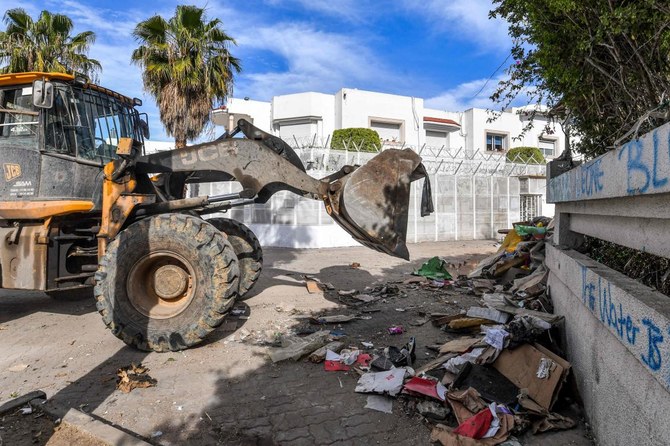
- The demonstration in the small town in central Tunisia follows recent crackdowns by authorities on similar encampments in the capital Tunis and other areas
- In El Amra, protesters called for the “departure” of migrants and the “quick” eviction of the thousands estimated to be staying there
EL AMRA, Tunisia: Hundreds of Tunisians rallied Saturday in the town of El Amra to protest makeshift camps for migrants primarily from sub-Saharan African countries, an AFP correspondent said.
The demonstration in the small town in central Tunisia follows recent crackdowns by authorities on similar encampments in the capital Tunis and other areas, often after complaints from local residents.
In El Amra, protesters called for the “departure” of migrants and the “quick” eviction of the thousands estimated to be staying there, the correspondent said.
Lawmaker Tarek Mahdi said that the “immediate solution” should be to get migrants to “leave urban areas and cities.”
The situation has become “unacceptable” and “the authorities must find a solution,” said Mahdi, who represents El Amra in parliament.
He added that other countries should help Tunisia to deal with a “very significant flow” of migrants.
The town is located about 40 kilometers (25 miles) north of Sfax, a key departure point for Europe-bound sea journeys from where migrants had been forcibly removed late last year.
Many migrants have fled to towns like El Amra, setting up encampments before they can make the perilous Mediterranean crossing, as Tunisian authorities and the European Union have ramped up efforts to curb irregular migration.
A surge of anti-migrant violence last year, following remarks by President Kais Saied who painted “illegal” foreigners as a demographic threat, has also pushed many out of main cities and into smaller towns.
Migrants attempting the sea crossing in search of a better life in Europe often aim to reach Italy, whose Lampedusa island lies some 150 kilometers away from Sfax, Tunisia’s second city.
In recent weeks, authorities raided several encampments, tearing down tents and expelling migrants.
The non-governmental Tunisian Forum for Social and Economic Rights said that authorities in Tunis on Friday cleared encampments and expelled hundreds of asylum seekers, migrants and refugees, sending them in buses to a western area near the Algerian border.
In a statement, the interior ministry said “security measures” had been taken to “deal with attacks on public and private property.”
Last month, Italian Prime Minister Giorgia Meloni visited Tunisia for a fourth time in less than a year to sign deals aiming to curb migration.
A day before her visit, Saied said that Tunisia must not become “a country of transit or settlement” for the tens of thousands of migrants attempting to cross the Mediterranean to Europe every year.
‘Substantial progress’ in Cairo talks on Gaza truce
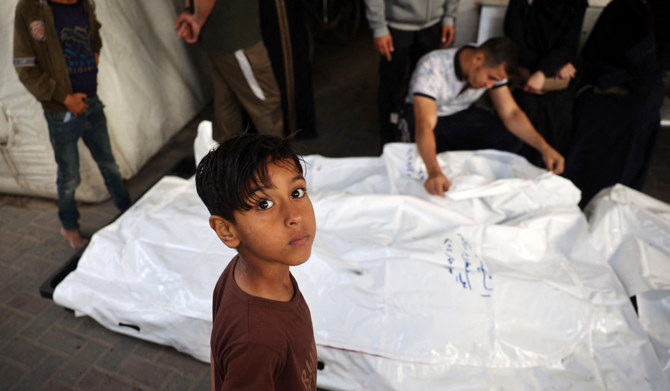
- The second phase will last at least six weeks, with both sides agreeing to release a larger number of hostages and prisoners, and also committing to a longer halt to the fighting
CAIRO: Talks in Cairo involving a Hamas delegation and Egyptian mediators have made substantial progress toward achieving a ceasefire in Gaza, according to a high-ranking source.
The source, who preferred not to be named, told Cairo News Channel that Hamas representatives and an Egyptian security delegation have reached consensus on many contentious points.
Hours before the Hamas delegation’s arrival in Cairo on Saturday, Gen. Abbas Kamel, chief of Egypt’s General Intelligence Directorate, received a phone call from the movement’s leader, Ismail Haniyeh, concerning the negotiations.
Security and political expert Ahmed Mustafa told Arab News: “According to my information, Hamas has agreed to the first phase of the ceasefire deal in Gaza.
“This includes the release of a number of hostages, with the assurance that Israel will fully withdraw from Gaza after 124 days, upon completion of the three stages of the major agreement being coordinated here in Cairo.”
Mustafa also said the Hamas delegation in Cairo is expected to inform the Egyptian side of its agreement with only minor amendments.
“I believe that Hamas has agreed on some terms with the Egyptian mediators now, and previously with the Qatari mediators under American guarantees,” he said.
However, Mustafa said that Israel’s refusal to end the war in Gaza as part of any hostage deal and its determination to eliminate what remains of Hamas remain “major points of contention.”
According to Mustafa, another point of disagreement concerns allowing the entry of dual-use materials into the enclave, for example humanitarian supplies that could also be used for combat purposes, such as fuel.
He said that the first phase, which Hamas “has tentatively agreed upon, will last up to 40 days, during which up to 33 of more than 100 Israeli hostages held in Gaza since Oct. 7 will be released.”
The second phase will last at least six weeks, with both sides agreeing to release a larger number of hostages and prisoners, and also committing to a longer halt to the fighting.
Aboud Jamal, a researcher on Palestinian affairs, told Arab News: “Hamas announced on Friday evening that settlements had been reached, and a delegation from the movement would head to Cairo on Saturday to secure an agreement in a way that meets the demands of the Palestinians.”
Jamal added: “It is clear that the coming days will witness an agreement to cease fire along with the release of some Israeli hostages.
“The only remaining issue is the stance of the Israeli government, which seems to want to prolong the war to maintain (Benjamin) Netanyahu’s government following the recent protests against him in Israel.”
Jamal said the Israeli government stands to benefit by obstructing any agreement.
“So, by sending its delegation to Cairo and discussing its agreement to terms in the prospective deal through mediators, Hamas has preempted the Tel Aviv government, a move for which the movement’s leaders are to be commended.”
He added: “It appears that Egypt truly stands with the Palestinian people and is supportive of reaching an agreement that ensures a ceasefire to save what can be saved of the lives of Gaza’s residents.
“This was evident from the statement issued by Hamas before its security delegation headed to Cairo, stating that Hamas leader Ismail Haniyeh appreciates the role that Egypt is playing.”



